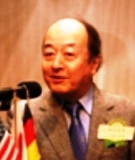��Behind the Scenes of Movie Music��
March 19, 2008
Mr. Shin-ichiro Ikebe,
Composer,
Professor of Tokyo College of Music
 ��There are two broad types of music. One is the area of ��pure music��, such as symphonies, operas, choral music, piano music, etc., to be performed in concerts. The other is the area of ��accompanying music�� for films, theater, and television dramas. Although I have done a lot of work for television drama and theater, today I will talk about the world of cinema.
��There are two broad types of music. One is the area of ��pure music��, such as symphonies, operas, choral music, piano music, etc., to be performed in concerts. The other is the area of ��accompanying music�� for films, theater, and television dramas. Although I have done a lot of work for television drama and theater, today I will talk about the world of cinema.
��I was in charge of the music for director Akira Kurosawa��s films, such as ��Kagemusha��, ��Yume��, and ��Madadayo��. The omnibus entitled ��Yume�� was particularly well received. Towards the end of the film, there is a scene where a funeral procession goes down a mountain path in a rural area. The instructions for the music in the scene were to ��make something that cannot be associated with any specific period or place��. Even though it was an impossible order, I composed about 15 short pieces and had the director listen to them. The response to the first few pieces was a series of nos. ��This is not bad,�� came around the eighth piece, followed by a ��Yes, this is nice, it��s good�ġ� at around the tenth piece. That is how the music was decided.
��I also had my own ideas, and had worked out a scheme of which order to play the songs. I arranged them with the general idea of when I should play the good pieces. Somehow it worked out well when I played the songs that I wanted the directory to choose, as the eighth or tenth piece.
��Japanese films have won the Palm D��Or, the grand prize of the Cannes Film Festival, four times in the past: Director Teinosuke Kinugasa��s ��Jigokumon��, Director Akira Kurosawa��s ��Kagemusha��, Director Shouhei Imamura��s ��Narayama Bushiko��, and Shouhei Imamura��s ��Unagi��. I composed the music for all except ��Jigokumon��. It is rewarding that the joy of encountering the great work of a great director has born fruit in this way.
��I also have many fond memories about Director Shouhei Imamura.
��In ��Narayama Bushiko��, there was a scene in which farmers sing as they work. That very song they are singing was composed by me. When I first sang the song to Director Imamura, he muttered, ��mmm�� I can visualize the five lines (i.e. the staff notation)��. He said, ��This song can��t be something that would sound like it was written on a music sheet, it has to sound like the music was born from the soil��. The song was supposed to be something that had been sung for a long time, passed down from the farmers�� ancestors, even though I was actually composing it.
��I reworked on the song, and asked him to listen to it again. After I sang it to him, he joked that he could ��still see about four lines��, but gave me an OK.
��I taught the song to the actors. The actors practiced��.many, many times, until the song became not just like a song they had just learned, but something that was engrained in their bodies, sung by generations of their ancestors.
��When I make a song ��that would have been born from the ground��, what brews within me is not music theory, but rather something like a physiological reaction. I feel like the sounds are living creatures, rather than physical phenomenon. As I write the notes, the sounds have their own will, and indicate where they want to move. The sounds would get angry if I try to do something that goes against their will.
��As much as sounds are like living creatures, they also resemble ��water��. Like water, it is easy for sounds to descend, but they need some kind of measure to ascend. They need to be given some energy.
��When I compose music, there are moments when I let the will of the music take over me. The music moves on its own. Even though I am the one who is composing the music, I capture the way the notes move in my mind and create the piece based on that movement. This state of mind of letting the music take over, is something that I have acquired through many years of work as a composer. I have gradually come to understand what the notes are thinking, and where they are trying to go. Upon reaching this point, I feel that I can say to the music that ��you are in charge��.
��I truly feel that through this job, I have been able to meet a really nice guy, called music. And, I believe that is the composer��s most treasured asset.